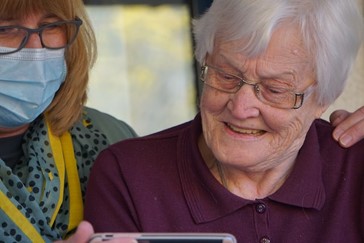
Traumatic brain injuries (TBIs) have the potential to bring about significant physical, cognitive, emotional, and social challenges that can deeply impact an individual’s quality of life. In the journey of rehabilitation and recovery from TBIs, occupational therapy plays a crucial role in helping individuals regain independence, re-establish meaningful activities, and ultimately improve their overall well-being.
MedRehab Alliance client programs offer guidance, reassurance, support, assessment, and intervention to help brain-injured individuals form such skills in everyday activities. Occupational therapists work closely with the patient, family members and caregivers to address functional difficulties to allow them to reach milestones and reacquire necessary life skills.
Understanding Traumatic Brain Injuries
Common TBIs often result from a sudden blow or jolt to the head, causing damage to the brain tissue, such as concussions and skull fractures as well as intracranial hematomas (ICH). There are several types of ICH, or blood clots, in or around the brain, which are classified by their location. These can range from mild to quite serious and potentially life-threatening injuries.
The consequences can range and can contribute to long-lasting impairments. Depending on the severity and location of the injury, individuals might experience a wide array of challenges.
The Significance of OT in Recovery
Occupational therapy is a holistic approach to rehabilitation that focuses on enabling individuals to engage in daily activities and tasks that are meaningful and necessary for their lives without assistance.
Tailored Therapy
OTs develop personalized treatment plans based on the individual’s unique needs, goals, and challenges. These plans are designed to improve motor skills, cognitive functions, and emotional regulation. For instance, if an individual has difficulty with fine motor skills, such as bathing, dressing or brushing their teeth, therapists may employ exercises and activities to enhance hand-eye coordination and dexterity, with activities like drawing.
Cognitive Exercises
Cognitive deficits often accompany TBIs, affecting either long- or short-term memory, attention, problem-solving, and decision-making. OTs provide various techniques to help individuals regain these skills. This might involve memory exercises, attention-building activities, and strategies to improve executive functioning.
Adaptive Techniques
Occupational therapists introduce adaptive techniques and tools to compensate for functional limitations. For instance, if an individual struggles with mobility, therapists might recommend assistive devices like walking aids. These techniques can enhance independence and enable individuals to carry out activities that they might otherwise find challenging.
Emotional and Psychological Support
TBIs can lead to emotional and psychological challenges, including mood swings, anxiety, and depression. Many brain injury treatment plans offer support in managing these emotional struggles, helping individuals develop better coping strategies, and stress management skills.
Getting Back to Life
Returning to one’s community and social life can be daunting after a TBI, no matter how severe. Assisting individuals with reintegration practices can help rebuild social skills, communication abilities, and the confidence to participate in leisure and social activities they once enjoyed pre-injury.

Family and Caregiver Education
Occupational therapy involves not just the patient, but also their family and caregivers. Therapists educate all parties about the individual’s condition, needs, and how to support the rehabilitation process at home. This education promotes a more supportive and conducive environment for recovery.
Long-Term Impact
The effects of a TBI can be long-lasting, requiring ongoing support and therapy for months, or even years. In providing continuous assessment, OTs can modify treatment plans, while guiding individuals towards progress in their recovery journey.
Final Thoughts
Occupational therapy is a cornerstone of rehabilitation for individuals with TBIs. Its comprehensive approach addresses the physical, cognitive, emotional, and social aspects of recovery, aiding individuals in regaining their independence and improving their overall quality of life.
Through personalized treatment plans, adaptive techniques, emotional support, and community reintegration efforts, OTs play a pivotal role in helping brain injured patients reclaim their lives.



